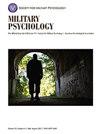对海军部署期间的需求、资源和自我调节进行定性调查。
IF 1.1
4区 心理学
Q3 PSYCHOLOGY, MULTIDISCIPLINARY
引用次数: 0
摘要
为海军人员创造一个可持续发展的工作场所对他们的健康和留任至关重要。本定性研究探讨了影响海军人员部署期间心理压力的工作和个人需求、资源以及压力自我调节策略之间的相互作用。我们对 25 名海军人员(68% 为男性)进行了半结构化关键信息访谈,以确定影响心理压力的海上需求和资源。研究结果表明,个人在应对策略(如恢复管理)、能力(如建立社会关系的能力)和对部署的心态(如目标感)方面的差异被认为是影响心理压力体验的因素。此外,支持他们的同伴和领导也被认为是一种重要的资源,而外部压力(如家庭危机)和机上的社会紧张局势(因空间狭小而加剧)则是普遍报告的需求。越来越多的研究表明,个人应对策略与工作设计之间存在着微妙的互动关系,我们的研究结果也为这些研究做出了贡献。我们发现,正式的组织支持有助于采取适应性的自我调节策略,而形成和维持积极关系的能力则有助于培养归属感,消除孤独感。另一个关键贡献是对组织所提供资源的评价存在个体差异,以及资源评价在人们认为资源如何有效满足船上需求方面的潜在重要性。我们就人员培训、干预和领导力方面的目标提出了建议,包括沟通、支持日常和平等的恢复机会、资源获取、保持士气和形成对需求的评估。本文章由计算机程序翻译,如有差异,请以英文原文为准。
A qualitative investigation of demands, resources and self-regulation during Navy deployment.
Creating a sustainable workplace for Navy personnel is vital for their wellbeing and retention. This qualitative study explores the interplay between job and personal demands, resources, and stress self-regulation strategies affecting psychological strain among Navy personnel during deployment. We conducted semi-structured key informant interviews with 25 Navy personnel (68% male) to determine the demands and resources at sea that affect psychological strain. The findings identified that individual differences in coping strategies (e.g., recovery management), abilities (i.e. ability to make social connections), and their mind-set about deployment (e.g., sense of purpose) were perceived to play a role in the experience of strain. Additionally, the presence of supportive peers and leaders was identified as a key resource, whereas external stressors (e.g., family crisis) and social tension onboard, amplified by confined spaces, were commonly reported demands. Our findings also contribute to a growing body of research suggesting a nuanced interaction between individual coping strategies and job design. Formal organizational support was identified as enabling adaptive self-regulation strategies, while the capacity to form and maintain positive relationships helped foster a sense of belonging, countering isolation. Another key contribution was the individual differences in the appraisal of resources offered by the organization and the potential importance of resource appraisal in how effective resources were perceived to be for addressing shipboard demands. We provide recommendations relating to targets for personnel training, interventions, and leadership in terms of communication, supporting day-to-day and equal opportunity for recovery, resource access, maintaining morale, and shaping the evaluation of demands.
求助全文
通过发布文献求助,成功后即可免费获取论文全文。
去求助
来源期刊

Military Psychology
PSYCHOLOGY, MULTIDISCIPLINARY-
CiteScore
2.30
自引率
18.20%
发文量
80
期刊介绍:
Military Psychology is the quarterly journal of Division 19 (Society for Military Psychology) of the American Psychological Association. The journal seeks to facilitate the scientific development of military psychology by encouraging communication between researchers and practitioners. The domain of military psychology is the conduct of research or practice of psychological principles within a military environment. The journal publishes behavioral science research articles having military applications in the areas of clinical and health psychology, training and human factors, manpower and personnel, social and organizational systems, and testing and measurement.
 求助内容:
求助内容: 应助结果提醒方式:
应助结果提醒方式:


